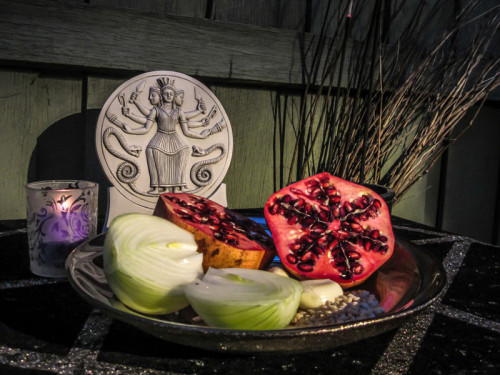![]() As sunset creeps ever closer towards what was afternoon just few short weeks ago, our activities and thoughts turn inward. Strolls through the brilliant foliage of October give way to the occasional bare tree patches that pop up in November. We cherish warm apple cider, and wear sweaters to ward off the cooler temperatures that mark the transition from the heat of summer to the cold of winter.
As sunset creeps ever closer towards what was afternoon just few short weeks ago, our activities and thoughts turn inward. Strolls through the brilliant foliage of October give way to the occasional bare tree patches that pop up in November. We cherish warm apple cider, and wear sweaters to ward off the cooler temperatures that mark the transition from the heat of summer to the cold of winter.
The Polish word for November is Listopad, a time when the leaves fall. In the Northern Hemisphere, this time of year is one when the veils are still thin between the worlds. For those who have given care, only to find that task at an end, there is a hidden joy: the celebration of those recently passed as we remember and mourn our ancestors.

As we gaze into the fire, we remember how the receivers of care would want the best for those who willingly gave the very essence of their lives to ensure that a loved one’s transition occurred in the most peaceful manner. Whether that care is a few hours or a few decades, those we love in caring for them do not leave us. They are near us at this time. Atropos has cut the cord, and the space that remains is one of encouragement to reengage with the world and to celebrate the length of life that Lachesis’ thread grants to each individual.
Joy can come in many forms. When the temperatures begin to drop, our taste buds begin to crave the savory and sweet. I have found myself eating more eggplant, one of my mother’s favorite dishes, and drinking pomegranate juice in honor of Hekate and other ancestors who have passed beyond.

[C. Paneque.]
These reminders of sight, sound, smell, taste, and touch invite joy, keep the memory of the loved one alive, and give purpose to what the loved one has left behind. Döstädning, or Swedish death cleaning, is a newer trend to reduce what one has in middle and later decades so that those who will sort what is left behind will not have quite so much to do. It sounds morbid, yet at a time of mourning, the one who has given care may sit and wonder, “what on earth am I going to do with all of this stuff?” The receiver of care probably never thought that there would be so much left behind. During life and the accumulation of experiences, disposal is rarely a primary concern for many.
Just as we can honor the ancestors and our closeness to the gods at this time of year through various ceremonies, celebrations, and communications with those beyond, we honor ourselves and our service by taking this time to carefully remove and dispose of what is no longer needed.
We can set up an ancestor altar or space for ancestor veneration and put our grandmother’s favorite piece of china in honor of her memory. If it is pitcher or bowl, perhaps it will hold food or water when we honor the ancestors in ritual.
We can wear a favorite scarf or a color preferred by a loved one in lieu of keeping 17 boxes of stuff that we may never be able to use.
The dying want one thing: the peace of being in a loving atmosphere with those who care for them surrounding them. The living need one thing: a finish point to then begin again.
The physical items that a loved needs carry emotional weight that goes far beyond the weight of the box. The task of the one who gives care is to recognize what is worth keeping, and what would best go to others. Is there a favorite carving or piece of furniture that you can enjoy in memory of your loved one? Great. Choose that. Less is more when it comes to memories.
Special cherished pieces of clothing can become a memory quilt. Letters and family documents can be scanned and used for genealogy purposes, artwork, or decoupage. Recipes can be made, shared, and enjoyed at family dinners for years to come.
Homeless shelters and relocation centers willingly will take any household items that will help someone else in need to build a new home. Maybe you hate that dish set or sofa that your loved one cherished. Organizations like Bridging will unite what is no longer needed with those who have a need.
Children’s centers, long-term care facilities, and waiting rooms accept magazines; libraries may accept books. Women’s shelters can always take unused clothing, children’s items, and toiletries. In other words, that stash that your aunt gathered from hotels over time might be useful for the local shelter instead of fodder for a local landfill. My mother was a social worker and librarian, so libraries and women’s shelters were high on the list of places for donations.
Sometimes a tree is planted in memory of one who has been loved. Others plant a garden, or pick out bulbs at this time to prepare for the spring.
As memory lives, so does the one who has passed on. We honor the earth, our ancestors, and our gods through the choice to recycle the physical, in lieu of agonizing over the weight of what is no longer needed. Each item touched is a time to honor the loved one by sharing and giving in that person’s memory.
We experienced the love by giving, by listening, by holding our loved one’s hands, and by being fully present with them. Now we honor our ancestors and care recipients by cleaning up and keeping only that which is necessary to engage in a vibrant life.
As we recycle the physical, those who cared for others have a challenge of finding a new label. When the leaves fall, the external around us gives a visual reminder that life itself needs to strip down to build up. The person giving care no longer has the title of “caregiver”. A new label needs to be found, but what? If you are caring for a partner or spouse, as labor in your own version of the underworld, a time and place of transition, what do you call yourself? Widow? Widower? I shall always be my mother’s daughter, but I have no label that fits this in-between time beyond “mourner.” The challenge of this time is to find a new identity rather remaining defined by a task of the past.
There is a new strength that comes as result of extended giving of care to another. We know what it is like to stretch ourselves far past human limitations while caring for someone else. Despite the pain, we have no regrets. This experience sears the knowledge into our souls: no longer can we take the ability to care for ourselves for granted.
In November, as the leaves fall, there is a reminder to honor the loved one in the manner that brings joy. For those who consider themselves to be Pagan, the gift of this season is not just the opportunity to do so, but the joy of having our loved ones visit us again, and again. As we spend time in the underworld, whether through solitary practice, group ritual, or just a walk in the woods with chthonic deities and our ancestors, we begin to heal.
Caring for others brings irrevocable change. Now we take a new path back to caring for ourselves.

* * *
The views and opinions expressed by our diverse panel of columnists and guest writers represent the many diverging perspectives held within the global Pagan, Heathen and polytheist communities, but do not necessarily reflect the views of The Wild Hunt Inc. or its management.
The Wild Hunt is not responsible for links to external content.
To join a conversation on this post:
Visit our The Wild Hunt subreddit! Point your favorite browser to https://www.reddit.com/r/The_Wild_Hunt_News/, then click “JOIN”. Make sure to click the bell, too, to be notified of new articles posted to our subreddit.